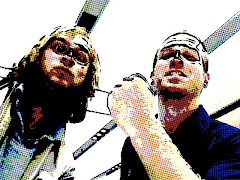
Often in the sound business, a good sound guy or gal is faced with what I refer to as the sonic black hole effect (SBHE). This occurs when a sound person who possesses the rare qualities of the master sound master (RQMSMs) attempts to perform high-quality sound adjustments on as many projects as he or she can possibly perform. This often involves working long into the night, making use of as many sound sources as possible to fabricate the impression of a unified sound essence (USE). This is great for the end-user's sound experience to be sure, but a number of secondary deficits may also occur. These deficits summed are what I refer to as the sonic black hole effect.
1. Time restricts perfection for the overly conscious. When a sound master is too conscious of the minutiae of the sound task at hand, time factors painfully into his inevitably disappointing result.
2. Sound is THE most effective tool for selling an illusion. It smooths the edges of both visible and invisible things. It is the main component of much of the subconscious trickery that occurs in media, across the board. A clever, media-minded project director knows the value of a good sound person--it's priceless. The value is. Thus, a final product that has not received the attention of the sound master feels devalued to the savvy creative director. Thus, more is added to the sound master's soundwork cue, taking us back to deficit 1.
3. The convenience and quality that results from a sound master's work hours can have a "chilling" effect on the sound capabilities of others. A sound master's greatest weapon is the EAR. He or she typically has two. Non-sound-mastered individuals also have about two ears. The problem, however, lies in an individual's confidence
 as it pertains to what they think they should be hearing. In truth, this value is subjective. Much of what we know about how our media should sound is conditioned by years of passive consumption. In other words, we want to hear things we don't even know we want to hear. Some of what we want is good. Some is bad. But those are matters of opinion along a sliding scale of variables. Your typical, non-sound-mastered individual looks at this gray area with trepidation. He or she may have tentative ideas about what sound-related issues need to be addressed, but those ideas often lose confidence-power when a sound master sits firmly in the workflow. Also, there is far less incentive for someone to learn basic sound processing protocol when they perceive that somebody else handles the tedious processes. Process-EASE. That's what they'll want. They'll wanna sweat over other things--things they believe they have better business sweating over. Now they don't know what's going on. Sound-wise. And now the sound master's soundpass possesses irrational value, which is described in deficit 2. Which leads, of course, to deficit 1. A perfect storm that only a sound master, like Moses, can successfully navigate with a displaced nation in tow.
as it pertains to what they think they should be hearing. In truth, this value is subjective. Much of what we know about how our media should sound is conditioned by years of passive consumption. In other words, we want to hear things we don't even know we want to hear. Some of what we want is good. Some is bad. But those are matters of opinion along a sliding scale of variables. Your typical, non-sound-mastered individual looks at this gray area with trepidation. He or she may have tentative ideas about what sound-related issues need to be addressed, but those ideas often lose confidence-power when a sound master sits firmly in the workflow. Also, there is far less incentive for someone to learn basic sound processing protocol when they perceive that somebody else handles the tedious processes. Process-EASE. That's what they'll want. They'll wanna sweat over other things--things they believe they have better business sweating over. Now they don't know what's going on. Sound-wise. And now the sound master's soundpass possesses irrational value, which is described in deficit 2. Which leads, of course, to deficit 1. A perfect storm that only a sound master, like Moses, can successfully navigate with a displaced nation in tow.




